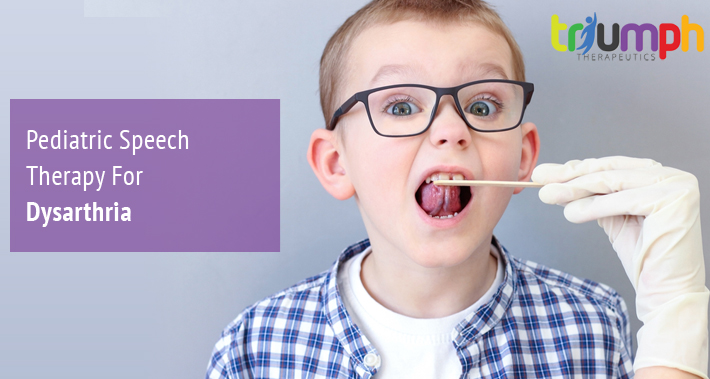Pediatric Speech Therapy For Dysarthria
https://www.triumphtherapeutics.com/wp-content/uploads/2021/11/Triumph-Therapeutics-Speech-Therapy-OT-Physcial-Therapist-Washington-DC-Nov03-01-2021.jpg 710 379 Triumph Therapeutics Triumph Therapeutics https://www.triumphtherapeutics.com/wp-content/uploads/2021/11/Triumph-Therapeutics-Speech-Therapy-OT-Physcial-Therapist-Washington-DC-Nov03-01-2021.jpgAs a parent, it’s exciting time when your child starts to learn to talk.
You’re probably keeping a close eye on them to see if they’re meeting speech milestones appropriate to their age.
And there is definitely excitement when they say their first word.
You listen carefully to catch those all important “first words”, and you feel pride when they say “mama” or “papa” or their sibling’s name for the first time.
However, there may also be some instances where you need to seek out speech therapy for kids.
Some reasons you may need to do this include hearing delays, tongue thrust, childhood apraxia of speech, and dysarthria.
Today we are going to have a closer look at dysarthria, and how speech therapy can help with it.
First, let’s have a look at what it is.
What Is Dysarthria?
Dysarthria is a speech disorder which occurs as a result of muscle weakness due to neuromuscular conditions, nervous system damage, or damage to the muscles used for speech.
This can result in problems related to the muscles used to create speech, which may be damaged or paralyzed.
Because of this it can be difficult to speak, and others may not understand what those with dysarthria are saying.
Types Of Dysarthria
There are two main types of dysarthria, depending on how the nervous system is affected.
Peripheral dysarthria is when there is damage to the organs required for speech, and central dysarthria is due to brain damage.
Additionally, it can be developmental or acquired.
Developmental dysarthria means it’s linked to brain damage which occurs before or at birth.
Acquired dysarthria is because of brain damage which occurs later in life.
Dysarthria in children tends to be developmental in nature.
Symptoms Of Dysarthria
If you think your child may have dysarthria, here are some things to watch for:
- Nasal, hoarse, or breathy speech
- Speech which is either too fast or slow
- Softer than normal speech
- Difficulty with moving their tongue, lips, and jaw
- Speech which is mumbled, or slurred
- Choppy or robotic sound to speech
Causes Of Dysarthria
Dysarthria can be caused by brain damage, or neuromuscular disease.
Examples of brain damage which can lead to dysarthria include:
- Traumatic brain injury
- Brain tumors
- Medication side effects
- Dementia
- Stroke
Some of the neuromuscular diseases which can lead to dysarthria include the following:
- Multiple sclerosis
- ALS/Lou Gehrig’s disease
- Cerebral palsy
- Huntington’s disease
- Muscular dystrophy
- Parkinson’s disease
A number of the diseases on this list usually develop later in life, however, and may not apply to pediatric patients.
A third type of dysarthria can be a result of damage to speech organs.
This could be due to being born with congenital structural problems related to speech organs, trauma to the face or mouth, or surgery to the neck, head, tongue or larynx.
Pediatric Speech Therapy Treatments For Dysarthria
If you suspect your child has dysarthria, you can see a speech therapist to seek a diagnosis.
They will do a speech therapy assessment of their ability to move their face, tongue, and lips, as well as how well they breathe.
In addition they may have your child perform simple tasks such as:
- Singing
- Counting
- Blowing out a candle
- Repeating words or phrases
- Sticking out their tongue
Diagnosis tests such as an MRI or CT scan may also be used during the assessment process.
Once we reach a diagnosis, your speech therapist can work with you and your child to create a treatment plan.
Treatment may involve a variety of methods, including:
- Practicing ways to slow down speech
- Methods to speak more clearly
- Exercise to strengthen the muscles used for speech
- Learning to chew and swallow safely
- Ways to speak louder and more clearly
- Alternative communication techniques
Book Your Appointment With Triumph Therapeutics Today
Have you noticed issues while your child is learning to speak?
Is their speech difficult to understand, or do they speak unusually fast – or too slowly?
Perhaps your child has a congenital condition which puts them at higher risk for dysarthria.
You want to get to the bottom of what’s going on as quickly as possible – your first call should be to Triumph Therapeutics.
Serving the Washington DC area, one of our speech language pathologists can assess your child for dysarthria or other common childhood speech disorders, and get them started on a treatment plan to help get them speaking normally as soon as possible.
Contact us today to set up an appointment.


